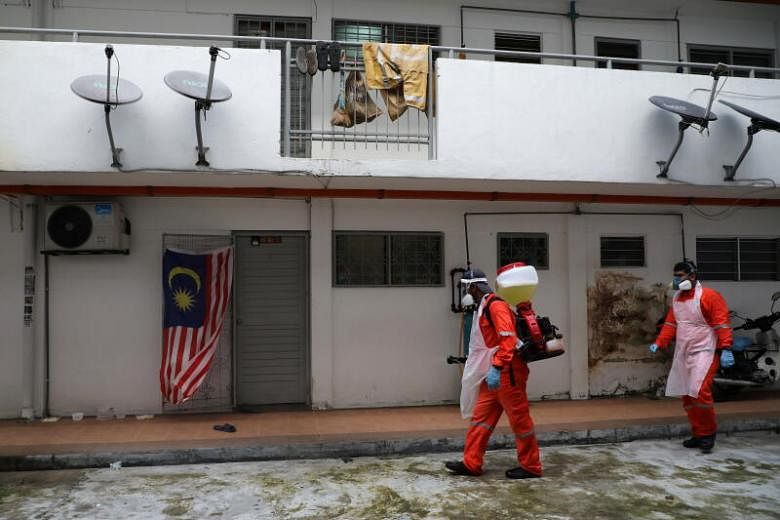KUALA LUMPUR - Stricter movement restrictions will not be the answer for Malaysia's battle against Covid-19, the country's public health experts said as the country's ongoing partial lockdowns - which has lasted for the past one month - have failed to bring down the daily infections.
Despite the introduction of the conditional movement control order (CMCO) in Klang Valley since Oct 14, the virus outbreak has shown no sign of abating in Malaysia's main economic regions.
The country recorded over 1,000 daily infections in nine of the last 14 days, from Nov 2, including a record high of 1,755 daily cases on Nov 6. The capital Kuala Lumpur alone recorded 475 cases on Sunday (Nov 15) after 460 cases were logged at a construction site.
Sunday's 475 cases was the first time in months that a Peninsular Malaysia state had eclipsed the number of cases in the Borneo state of Sabah, which was the epicentre of Malaysia's third wave of Covid-19 cases.
Health chief Noor Hisham Abdullah said on Monday (Nov 16) the CMCO had worked well but conceded it might take longer to break the chain of infection compared to a stricter lockdown. He noted that the CMCO had in fact lowered the Covid-19 infectivity rate.
"I don't consider the CMCO as a failure because it was an option to strike a balance between lives and livelihood, while we are still able to conduct our public health intervention activities," he said, according to the Malay Mail.
Tan Sri Dr Noor Hisham said the basic reproduction number of Covid-19 infections was now between 0.9 and 1.1, down from 2.2 when the third wave of the pandemic began.
Malaysian Public Health Physicians Association president Zainal Ariffin Omar said the the government should re-analyse its data and interventions to focus on the most vulnerable groups.
"Not MCO. Not CMCO. But enhanced MCO (targeted lockdowns) in very specific locations and premises," Datuk Dr Zainal told The Straits Times. "Active clusters such as Kaya, Cergas are examples of weaknesses in CMCO. At the same time, increase testing and isolation."
Dr Zainal was referring to clusters originating in workplace communities that eventually recorded high numbers of positive cases. These compare with the previous trend where most cases were originating from prisons and detention centres.
Enhanced MCO, or EMCO, refers to full lockdowns in only a small area where infections are high. Barbed wire fences are placed around these "red zones" - with more than 40 cases logged in the past 14 days - no one is allowed to enter or leave for two weeks, and every resident is tested for the virus.
Malaysia on Monday (Nov 16) reported another above-1,000 cases, with 1,103 new Covid-19 infections - the fourth consecutive day of with a four-digit figure. This brings the cumulative total number of cases in the country to 48,520.
Kuala Lumpur on Monday recorded the highest number of new cases on Monday, with 392 cases (49.3 of the total).
Out of these, 385 were from the Damanlela construction site cluster.
The government on Monday announced EMCO for dormitories operated by glovemaker Top Glove and the surrounding areas in Klang.
Another area called Medan 88, near the Kuala Lumpur International Airport in Sepang, was placed under EMCO last week.
Under the CMCO, which now affects nine of Malaysia's 13 states and all three federal territories - Kuala Lumpur, Putrajaya and Labuan - the public can still travel to work and shop but cannot cross state borders except for work or emergencies. Mass gatherings such as religious services are banned, and only three people are allowed to travel in the same vehicle.
"CMCO did work to some extent. Otherwise we would see a lot more cases. The act of balancing between opening up and restricted movement often resulted in confused standard operating procedures (SOP)," he said.
Universiti Putra Malaysia epidemiologist Malina Osman meanwhile said that Malaysia does not have a "better choice" except to educate people to ensure better compliance of the CMCO restrictions.
"Enhanced MCO may be needed but the distribution of the infection in the community as well as issues related to logistics may not allow it to be a favourable choice," Associate Professor Malina told The Straits Times.
"The keyword is to remain patient under this CMCO, continue complying with the SOPs and help each other to strengthen the preventive measures, and to care for the society as well," she added, adding that an increased testing regimen is also costly for the government as there is currently no vaccine in the market for the virus.
Calculations by health news site Code Blue over the weekend showed that the average number of daily cases in Klang valley - a region covering Selangor state, Kuala Lumpur and administrative capital Putrajaya - has continuously increased since the CMCO was implemented.
The region averaged 83 cases a day when the CMCO first started in the second week of October, but the average jumped to 265 cases a day by the end of the last week.
Former prime minister Mahathir Mohamad had also called for more targeted lockdowns instead of a blanket semi-lockdown, which he said was hurting the nation's economy and the less privileged group.
Malaysia's Science, Technology and Innovation Minister Khairy Jamaluddin on Monday said that Malaysia is already in talks with at least eight producers of the Covid-19 vaccine.












